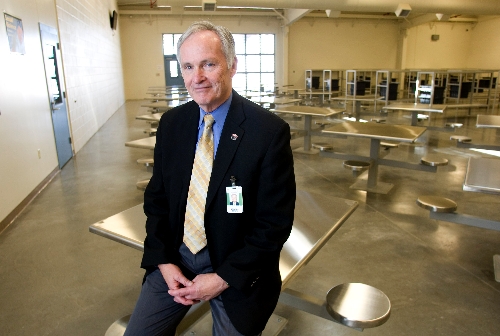Warden of new Pahrump prison realizes he’s a target
Although for-profit prisons have been around for more than two decades, time has not diluted the opposition to them by community and national groups.
So as warden Joseph Ponte opens the Nevada Southern Detention Center on Oct. 1 as Nevada's first for-profit prison, he realizes he will have a bull's-eye on his back.
"If there were two escapes tomorrow, one from a private facility and one from a public facility, the private facility would be all over the papers," said Ponte, who has been a warden in both types of prisons during his 41-year career. "The public facility would hit the press a little bit and go away. No one ever advocated closing a public facility down because they had an escape."
Nevada Southern, built by Nashville, Tenn.-based Corrections Corp. of America for $83.5 million, will look different than traditional prisons in more than just ownership. Prisoners can meet with outsiders, except lawyers, only through closed-circuit video feeds. In-person contact, in a large room or separated by heavy glass, has passed into history.
The cell blocks are monitored by 108 cameras, all linked to an elaborate control room.
Nevada Southern opens with 1,072 beds, designed to house people for a one to three months on average as their cases go through the federal courts in Las Vegas. Corrections Corp. of America will earn $84.96 a day for each prisoner, with a guarantee of at least 750 inmates a day.
Question: Prison life has been a favorite of Hollywood for decades. How realistic is what the public sees?
Answer: I think most of it is an exaggeration, sensationalized versions of the few events that happen. Most of prison life is pretty uniform and consistent. Most inmates understand they have an amount of time to do and occupy their time pretty effectively. Like any other microsociety, there are troublemakers, there are people that act as criminals within criminals and want to deal drugs or want to assault or strong-arm people. But those numbers are fairly small.
Question: Wardens are often portrayed as corrupt, autocratic or even tyrannical. Inside the fences, they are the law. Is that the way it works?
Answer: That was probably true a long time ago, but it's not true any more. Part of what has changed a lot within every system, including CCA, is that we are governed by policies and procedures. We do our own internal audits to make sure our practices are sound and CCA does external audits on us at least once a year. The courts have obviously been very active in prison reform. Those days where wardens could do what they wanted are long gone. You need to be a businessman, a coach, a mentor to your staff, a role model for inmates.
Question: What does a warden do?
Answer: For me and our executive staff here, we state from the beginning that what's important is our line staff. We need to perform any role that supports them. That can mean sitting in a cell block with them to get a job done, training them and listening to their issues and complaints. We are a business and here to make a profit, but the focus has to be on the staff. We are also out there interacting with inmates every day. If an inmate has a problem, trying to continue criminal activity in custody, we want to catch that early. My philosophy is you can't be out there (in the cell blocks) enough. That's where the business end of what we do happens. You can reduce incidents. You can reduce staff turnover. All of those things are expensive.
Question: You've had a lot of experience in both government and private prisons. What's the difference that you see?
Answer: With a number of state systems, the wardens have a little more autonomy with the expectation that you do the job and do it well. In the private sector, the expectation is much higher, that you need to do a better job because our mistakes harm our reputation. If we have a lot of mistakes, governments aren't going to hire us to house their inmates. On the public side, they will lay people off and you might hear about things being unsafe, but you won't see an outcry. If we did that same thing, there would be an outcry that we're cutting corners and want to save money. It's almost an anti-business philosophy.
Question: In a typical company, somebody in your position would have responsibility for the financial performance. Is that true with you?
Answer: Absolutely. Financial performance goals are set every year and we work hard to achieve those.
Question: You can't have sales or create new prisoners. You house the people the courts send you at a fixed payment rate.
Question: How can you boost revenues?
Answer: We can do good work and make the facility user friendly so that our customer, U.S. Marshall and possibly ICE (U.S. Immigration and Customs Enforcement), will want to put prisoners here. The other side of what we try to do is look for more opportunities to serve our customer to keep our inmate counts high. For example, if the numbers work I could build a dormitory to house 100 females currently at another place that's saying (it is) running out of space. You're not going to find a public corrections place that is going to do that.
Question: How did you get into this business?
Answer: I was in the service, had gotten out and was looking for work. I bumped into somebody who was working in a prison in Massachusetts and said it was a great job and good benefits. Being young and looking for a career, I went down and got hired. Most of us that get into this business were planning to do something else. For whatever reason, we got into it and liked it.
Question: What's the difference in compensation between private and government prisons?
Answer: Generally speaking, in the private sector, you get paid a little bit more. But if you look in the last couple of years, in some cases the pay is better on the public side. The private side adjusts (its) salaries to what's happening out there. For CCA, as any other private company, the contract sets a per diem on what you get paid for each inmate and that will set the salaries. If you have a contract with a good per diem and make a reasonably good profit, you are going to make more money in all of our positions than if you are working in a facility with per diem is really close and profit margins are really close.
Question: Are performance bonuses in there as well?
Answer: Yes, there are performance plans set at the start of every year. If we achieve them, our bonuses will be more.
Question: What techniques do you use to avoid becoming complacent?
Answer: We want to be as unpredictable as they (inmates) are. We run a lot of drills on staff. We need to make sure that what we practice works. We need to make sure we do good cell searches. Sometimes, we will hide things in a cell to make sure they (guards) are actually looking in the right places. I try to think about what kinds of things inmates would be thinking about.
Question: Do you think you have become good at thinking like an inmate?
Answer: Yes. I think I have gotten good at being unpredictable, unpredictable for inmates and unpredictable for the staff. I am always looking to come in a different way, a different approach, thinking about what I haven't don't this week, what systems I haven't tested to make sure I stay one step ahead of the inmates.
Question: Since you're 63, is this your last stop?
Answer: You kind of wonder about those things, but I get up every morning and can't wait to get to work. I enjoy the people, enjoy the business. CCA does not have a mandatory 65 retirement age.
Contact reporter Tim O'Reiley at toreiley@lvbusinesspress.com or 702-387-5290.
VITAL STATISTICS
Name: Joseph Ponte.
Position: Warden, Nevada Southern Detention Center.
Family: Married, grown son and daughter.
Education: Associates degree in business management from Fisher College in Boston. Bachelor's degree in political science from Bridgewater State College in Bridgewater, Mass.
Work history: Five years, U.S. Marine Corps. Massachusetts Department of Corrections, starting as a prison guard in 1969 and rising to assistant deputy commissioner in 21 years; two years in management at Rhode Island Department of Corrections; regional manager with Cornell Corrections, 1993-97; director of Union County Jail in New Jersey in 1997; administrator of prisons at Idaho Department of Corrections in 1998; director of Shelby County Jail in Memphis, Tenn., from 2001-2006; joined Corrections Corp. of America in 2006 as warden of the Bay County Jail in Panama City, Fla.; named warden in Pahrump in 2008.
Hobbies: Outdoors activities, including fishing, hiking and hunting.
Favorite prison movie: The Shawshank Redemption (1994).
Hometown: Franklin, Mass.
In Pahrump since: April.




























